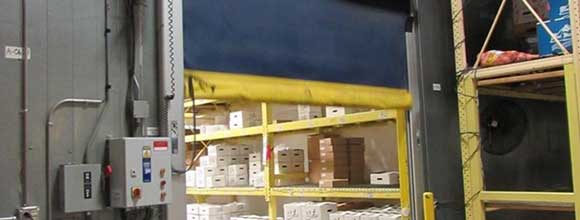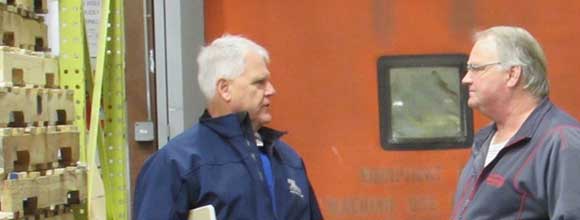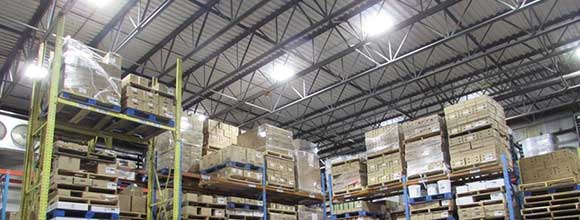Food distributor looks to Minnesota Power to help satisfy its appetite for energy efficiency
Jan 20, 2017
Crisp green lettuce. Ripe red tomatoes. Fresh, wholesome meat and dairy. Food quality is extremely important to consumers, whether they are shopping at their local market or dining at a favorite restaurant.
Upper Lakes Foods, headquartered in Cloquet, Minn., is the largest independent food distributor in Minnesota. It deals with thousands of products every day, ranging from fresh meat, poultry and produce to dry goods and frozen foods. Proper lighting and precise temperatures in its wholesale warehouse and distribution facilities help the company deliver quality food products that meet customers’ high expectations.
Upper Lakes Foods has invested in a broad range of lighting, refrigeration and heating, ventilation and air conditioning (HVAC) upgrades over the past several years. It works hand in hand with Minnesota Power’s Power of One Business conservation improvement program (CIP) to test, install and verify high performance technologies that save electricity, lower costs and advance Upper Lakes Foods’ quality assurance goals—while meeting its commitment to sustainability.
One early initiative was a warehouse lighting upgrade to energy-efficient high bay fluorescents with occupancy sensors, completed in 2009. That successful project led to the installation of energy-efficient garage and freezer lighting and an ongoing transition to light emitting diodes, commonly called LEDs. A number of LED lighting projects were completed in 2016, and more are being planned throughout the facility. Minnesota Power provides sample bulbs and fixtures to help the company make informed decisions.
"We tested LEDs in my office, and it is a clear, better light for a work environment," said Brenda Weston, credit manager and member of Upper Lakes Foods’ onsite sustainability team. "I love being able to test different products; it really pushes us forward."
"Good lighting helps ensure freshness of the food, but there is also a safety aspect," said Brian Sorensen, warehouse manager. "People move around on heavy equipment in our warehouse, and it is important for them to see what they’re doing. The new LED lighting in the freezer, for example, is much brighter and safer."
Lighting is not the only improvement making Upper Lakes Foods’ freezers more energy efficient. Fast-acting automatic doors have been installed on coolers and freezers to prevent cold air from escaping into unconditioned space.
"The doors go up and down rapidly to keep cold air where it needs to be and maintain cooler and freezer temperatures," said Matt Haley of Energy Insight Inc., a commercial energy consultant for Minnesota Power. "That has brought significant energy savings."
Minnesota Power has contributed more than $20,000 in research and development grants for Upper Lakes Foods to upgrade a rooftop HVAC unit with variable speed controls and for a new Discus™ Digital Compressor and Controller that adjusts energy use to actual demand for refrigeration. In addition, Upper Lakes Foods has reinsulated rooftop refrigeration lines with reflective coatings to ward off heat from the sun. Data logging is helping to measure and verify energy savings from refrigeration upgrades.
"Data logging works very well," said Craig Kedrowski, energy efficiency analyst–lead, Minnesota Power. "New technologies often come with claims of energy savings, but it is important to verify savings for customers and for our own sake."
Energy conservation improvements made at Upper Lakes Foods since 2009 add up to significant savings. They are helping the company save or avoid more than 1.8 million kilowatt-hours of electricity per year and reduce monthly demand by more than 137 kilowatts. In addition to the research grants, projects completed at Upper Lakes Foods have qualified for more than $61,000 in Minnesota Power commercial conservation rebates.
"Rebates help drive projects," said Wendy Wojtysiak-Erickson, inside sales manager and sustainability team member. "If you have multiple projects on the table and one has a rebate associated with it, that comes into play in making the decision."
"It is great to work with Minnesota Power," said Rob Fitzgerald, maintenance manager, Upper Lakes Foods. "We always look for ways to make Upper Lakes Foods more energy efficient, from compressors to lighting, whatever we can do to save energy and money. Minnesota Power offers suggestions, and they show us costs and benefits."
Some benefits of energy conservation are less tangible than others. Upper Lakes Foods participated in the Sustainable Twin Ports Early Adopter program in 2014–2015 and continues to incorporate environmentally, economically and socially sustainable practices into its operations. The onsite sustainability team was formed as part of that effort to educate and engage the entire staff.
"It makes business sense to be a good corporate citizen and a leader in sustainability," said Craig Ryan, buyer for Upper Lakes Foods and a member of the sustainability team. "Employees want to feel connected to something bigger than selling groceries, and our customers feel the same way. Minnesota Power is a good resource and partner."
"Upper Lakes Foods and Minnesota Power have a long relationship built on trust," Kedrowski said. "We approach them to test new technologies, and they contact us for advice and energy- and cost-saving estimates before beginning any facility improvement projects. It is good for both of our companies and for a more sustainable region."
Profiles of other customers helped by Minnesota Power’s Conservation Improvement Program can be found at www.mnpower.com/EnergyConservation/CustomerProfiles.
For information about how you or your business can save energy, click here.





